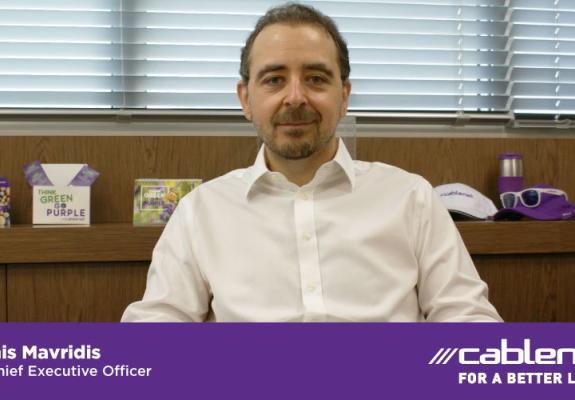George Psomas on the Changing Landscape of Corporate Finance
Founder of Falconeye Advisors: "In Business, Like in Many Other Areas, There Are No Perfect Solutions”
Founded by George Psomas, Falconeye Advisors specializes in transaction advisory, focusing on solving strategic challenges with a senior-level approach. George's extensive background in finance, engineering, and political science informs the firm's commitment to a comprehensive understanding of each client's unique needs.
In this interview, George explains how his diverse educational background has shaped his approach to financial advisory. He also elaborates on how the combination of technical expertise and interpersonal skills has influenced Falconeye Advisors' strategy for addressing business challenges. The discussion touches on the evolution of the financial industry in Cyprus, the growing presence of international investors, and Falconeye's role in facilitating these developments. Finally, George shares his views on maintaining integrity and trust in financial advisory, offering insights into the principles that build a lasting reputation in the industry.
Engineering has equipped me with technical proficiency and an analytical approach to maximise client value and navigate transaction complexities. At the same time, my graduate degrees in political science and international relations, with a focus in negotiations and game theory, provided me with a deeper understanding of human nature, psychology and counterparty motivations/incentives all of which are key to navigating a transaction to a successful conclusion.
I am a firm believer that a combination of both technical and soft skills is the best way to approach complex business challenges
I am a firm believer that a combination of both technical and soft skills is the best way to approach complex business challenges, whether that is the sale of a company, the restructuring of a division or the pivoting to a different business model than the current one. Falconeye was born out of my belief that applying this senior focus to business problems can really unlock value to clients and uncover the optimal path forward.
I think the biggest change in the industry has been the entrance of international investors in the Cyprus business landscape and the emergence of local companies that have international aspirations. Partly driven by the need created during the various local economic crises, the two latest examples being the pandemic in 2020-2022 and the banking sector implosion during 2012-2013, and partly as a response to the ever-increasing connectivity across the international business, Cypriot companies have looked outwards for expansion and diversification.
The biggest change in the industry has been the entrance of international investors in the Cyprus business landscape and the emergence of local companies that have international aspirations
At the same time, we have international investors who are either looking to acquire Cypriot companies as part of their strategy, most recent examples the acquisitions of some of the largest healthcare clinics, or have relocated to Cyprus and set up offices here, examples include Wargaming, MUFG, Murex and many others. Falconeye acts as a facilitator to this process, advising either acquirers of companies, target companies or companies that wish to expand and they need help with feasibility studies and business plans.
With the advent of AI tools, Excel templates and wide availability of information through the internet it has become increasingly simple to produce deliverables that from the outset seem and look professional but are generic, formulaic and fail to take into account the unique circumstances of the client. We aspire, and I use the word deliberately, to be different. We focus on substance over presentation, we understand that in business, like in many other areas, there are no perfect solutions therefore our approach to a business challenge should be thoughtful, stemming from a deep understanding of the client’s issues, and iterative i.e. to be willing to change in the face of new data and developments. To us these are the qualities implied by bringing senior focus to challenges.
There are volumes and volumes of books written on the subject, a proof in itself of how hard it is to answer this question. However, if I were to try and give some general advice, something I do with a lot of trepidation as I do not claim to have the solution, I would say that business leaders should constantly challenge their colleagues to re-visit their assumptions, knowing that what was working very well for them might not work in the future (some notable examples of companies that forgot to do that are Kodak, Polaroid, Nokia), foster a work culture that encourages diverse thinking, hire people that are smarter than them, and provide incentives to workers to align their financial well-being to that of the company. These as some general principles.
Business leaders should constantly challenge their colleagues to re-visit their assumptions, knowing that what was working very well for them might not work in the future
Turning to more mundane advice I would advise business leaders to constantly watch their cashflow and have reserves to weather a downturn (Microsoft famously always maintained a cash pile to cover 12 months of operating expenses and salaries assuming zero revenues), have good systems in place to measure key performance indications (KPIs), both forward and backward looking, and take corrective action earlier rather than later.
Before I answered this question, I thought I’d get some help from ChatGPT-4 as to see what the distilled ‘wisdom’ of the internet had to say. ChatGPT complied and said, in brief, that “Critical factors …. include transparent communication, ethical conduct, compliance with regulations, putting clients' interests first, providing unbiased advice, maintaining confidentiality, managing conflicts of interest effectively [and] delivering on promises…. .“
Indeed, these are the factors that come to mind when thinking about integrity and trust. But a key ingredient that is not mentioned here is the importance of time in building a reputation for integrity and trust. One can pay lip service to these qualities, however, the true test of adhering to these values comes only with time and finding yourself as a professional in situations where your values are tested and you manage to navigate through. This is how a reputation for integrity and trust is built. And as difficult it is to build, it is as easy to destroy. As Warren Buffet’s once famously said: “It takes 20 years to build a reputation and five minutes to ruin it. If you think about that, you'll do things differently.” This, more than anything, acts as guiding light to the way I conduct myself as a professional.







